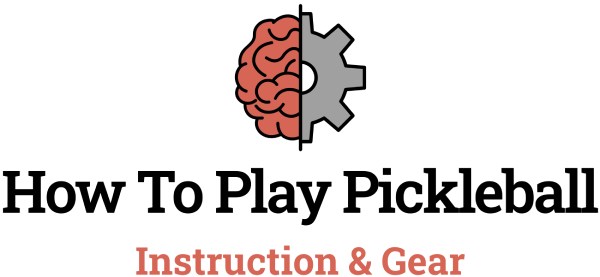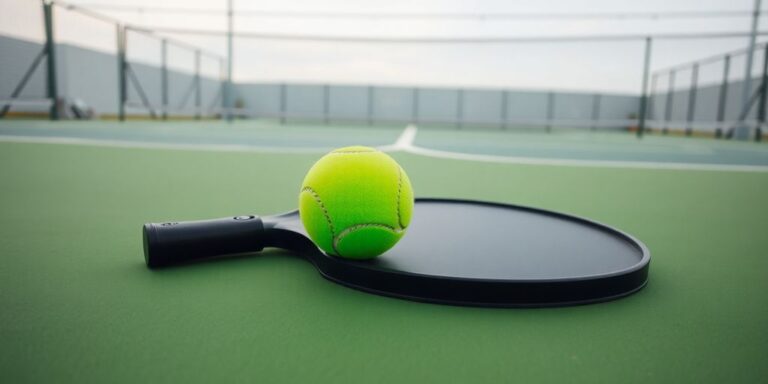Ever wondered why pickleball is called pickleball? It’s a funny name, right? Turns out, there’s a pretty interesting story behind it. This article will take you through how this popular game got its quirky name and the tales that surround it. From its beginnings to the tales of how the name came to be, we’ll explore it all. Let’s dive into the world of pickleball and unravel the mystery of its name.
Key Takeaways
- Pickleball’s name has roots in a mix of family fun and a dog named Pickles.
- There are several stories about how pickleball got its name, but the most popular involves a family pet.
- Joan Pritchard, one of the key figures in the sport’s history, played a role in naming it.
- The name has nothing to do with pickles, despite what many might think.
- Pickleball’s unique name has helped it stand out and grow in popularity.
The Origins of Pickleball
The Birthplace of Pickleball
Pickleball’s story begins on a lazy summer day in 1965 on Bainbridge Island, Washington. This picturesque location, just a short ferry ride from Seattle, is where the magic started. A couple of families were looking for a way to entertain their bored kids, and that’s when the idea of pickleball was born. Bainbridge Island became the cradle of this now-popular sport.
- Bainbridge Island, Washington
- Year: 1965
- Initial Purpose: Entertainment for kids
Key Figures in Pickleball’s Creation
The birth of pickleball can be credited to three inventive dads: Joel Pritchard, Bill Bell, and Barney McCallum. These men were determined to create a game that everyone could enjoy, regardless of age or skill level. They improvised with what they had—ping-pong paddles, a wiffle ball, and a makeshift net—and a new sport was born.
- Joel Pritchard – A U.S. Congressman who had a knack for innovation.
- Bill Bell – A successful businessman with a love for sports.
- Barney McCallum – A family friend who helped refine the game rules.
It’s fascinating how a simple backyard game idea by three dads has transformed into a global phenomenon, blending elements of tennis, badminton, and ping-pong.
Early Days and Development
In its early days, pickleball was a casual backyard game played on an improvised court. The rules were simple, and the equipment was basic. But the game’s charm was undeniable, and soon it spread beyond Bainbridge Island. Families and friends were drawn to its simplicity and fun.
- Initially played with makeshift equipment
- Simple rules made it accessible
- Quickly gained popularity among locals
Pickleball’s evolution from a simple island pastime to a beloved sport worldwide showcases the power of community and creativity. Today, it’s not just a game; it’s a testament to how a simple idea can bring people together and create lasting connections.
The Story Behind the Name
The Pickle Boat Connection
One of the most popular stories about how pickleball got its quirky name is the Boat Theory. According to this tale, Joan Pritchard, who was deeply involved in the game’s creation, drew inspiration from the term "pickle boat." In rowing, a pickle boat is the last boat to return with its mishmash of leftover rowers. This idea of combining different elements resonated with the new sport, which itself was a blend of various games.
Joan Pritchard’s Influence
Joan Pritchard’s role in naming pickleball cannot be overstated. As the wife of one of the sport’s co-founders, she was right there at the start of it all. Her clever use of the pickle boat analogy not only gave the game a catchy name but also a story that has stuck around. Her influence was pivotal in shaping the identity of the sport, and many believe that without her, the game might have ended up with a much less memorable name.
Debunking Common Myths
Over the years, several myths have popped up about how pickleball got its name. One of the most entertaining is the dog story, where it’s said the game was named after a dog named Pickles who would chase after the ball. While it adds a fun twist, this story has been largely debunked. In reality, the name "pickleball" is more about the playful mix of sports and the camaraderie it fosters. Another myth suggests it was a random choice, but the truth is far more connected to the sport’s origins and its creators’ intentions.
The name "pickleball" isn’t just a label; it’s a reflection of the sport’s playful spirit and its roots in bringing people together for fun and friendly competition.
Cultural Impact on the Naming
Influence of Local Culture
Pickleball’s roots are deeply tied to the local culture of Bainbridge Island, Washington, where it all began in 1965. The community’s spirit of innovation and playfulness played a significant role in shaping the sport and its quirky name. The blend of tennis, badminton, and ping pong into a single sport reflects the community’s creative mindset. The island’s laid-back vibe and emphasis on fun over competition influenced not just how the game was played, but also how it was perceived and named.
Community Involvement in Naming
The process of naming pickleball wasn’t just a decision made by its creators; it was a community affair. The name "pickleball" itself was inspired by the island’s residents, who often gathered to play and socialize. The communal aspect of the game encouraged everyone to pitch in with ideas, leading to a name that was as unique as the sport itself.
- Residents would often suggest names during casual gatherings.
- The playful nature of the name reflects the community’s spirit.
- It became a talking point, drawing more people to the sport.
Evolution of the Name Over Time
Over the years, the name "pickleball" has evolved in its significance and recognition. Initially, it was a curiosity, a name that sparked questions and interest. As the sport grew, so did the understanding and acceptance of its name.
What started as a peculiar name has now become synonymous with fun, inclusivity, and community spirit. The evolution of the name mirrors the sport’s journey from a backyard pastime to a national sensation.
Today, pickleball stands out not just for its gameplay but for the story behind its name, a testament to the sport’s cultural influence and the community that nurtured it.
Comparing Pickleball to Other Sports

Similarities with Tennis and Badminton
Pickleball, originating as a backyard game in 1965, shares several features with tennis and badminton. It’s played on a court with a net, and players use paddles to hit a ball back and forth. The game can be played in singles or doubles, much like tennis. The court dimensions are similar to a doubles badminton court, which makes it accessible and familiar to those who have played these sports before.
Unique Aspects of Pickleball
While it borrows from other sports, pickleball has its own unique charm. The game uses a plastic ball with holes, which affects its flight and speed. The underhand serve and two-bounce rule are distinctive features, setting it apart from tennis and badminton. These rules make the game more strategic and accessible, especially for beginners. Plus, pickleball’s smaller court size means less running and more emphasis on quick reflexes and smart positioning.
Why the Name Stands Out
The name "pickleball" is catchy and memorable, which helps it stand out among other sports. Some say it’s named after the inventor’s dog, while others believe it refers to a "pickle boat" in crew racing. Whatever the origin, the name adds an element of fun and curiosity, drawing people in. As pickleball continues to grow, its quirky name becomes a talking point, sparking interest and conversation among new players and enthusiasts alike.
The Role of Media in Popularizing the Name
Media Coverage in the Early Years
Back when pickleball was just getting started, media coverage was like a gentle ripple. Small newspapers and local TV stations took the lead, sharing stories about this quirky new sport. They highlighted its fun nature and how it brought communities together. These early stories were crucial in sparking interest. People were curious about why it was called "pickleball," and the media fed that curiosity with tales of its origins and playful spirit. Over time, national outlets caught on, and the sport began to gain a wider audience.
How the Name Caught On
The name "pickleball" itself became a talking point. It was catchy, a bit odd, and definitely memorable. As media outlets continued to cover the sport, they often focused on the name’s unique backstory. This helped cement it in people’s minds. The media played a big role in making "pickleball" a household name. They loved sharing how the sport combined elements of tennis, badminton, and ping-pong, which made it relatable and intriguing for a broad audience.
Celebrity Endorsements and Their Impact
Celebrities jumping on the pickleball bandwagon gave the sport a huge boost. When famous faces started playing and talking about it, media outlets couldn’t resist covering these stories. It wasn’t just about the game anymore; it was about who was playing it. This celebrity involvement added a layer of glamour and excitement, making more people want to try it out. Suddenly, pickleball was more than just a sport; it was a trend, and everyone wanted in on it.
The media’s role in popularizing pickleball wasn’t just about coverage; it was about creating a narrative that people wanted to be a part of. From small-town papers to national broadcasts, the story of pickleball and its quirky name captured hearts and imaginations, leading to its growing popularity today.
Personal Stories and Anecdotes
Interviews with the Founders
When you dive into the history of pickleball, you’ll find a tapestry woven with personal stories and quirky anecdotes. Joel Pritchard, Bill Bell, and Barney McCallum are the names that come up repeatedly. They didn’t just create a sport; they sparked a movement. In interviews, they often reminisced about those early days in 1965 when they were just trying to keep their families entertained. The game was born out of necessity, a makeshift solution to summer boredom. And who would’ve thought it would catch on like wildfire?
Stories from Early Players
The early players of pickleball have their own tales to tell. Imagine a group of neighbors, gathering in a cul-de-sac, paddles in hand, ready to play a game that seemed a bit odd at first. They’d laugh at the funny name, wondering how a game could be named after a dog. Yet, there was something about it—something addictive. Players would share tips, tweak rules, and before long, they were hooked. Those backyard games laid the groundwork for what would become a beloved sport.
Memorable Moments in Pickleball History
Pickleball’s history is peppered with memorable moments. From the first official tournament to the introduction of standardized rules, each milestone marked a new chapter. One can’t help but smile at the story of Joan Pritchard, who suggested the quirky name after the family dog, Pickles, who loved to chase the ball. These moments, whether big or small, have contributed to pickleball’s unique charm and enduring appeal.
"Pickleball is more than just a game; it’s a community, a shared experience that brings people together. From its humble beginnings to its global reach, the stories of those who played in their backyards are as much a part of its history as the sport itself."
The Legacy of Pickleball’s Name

How the Name Reflects the Sport’s Spirit
Pickleball, with its quirky name, captures the playful essence of the sport. It’s a game that’s accessible, fun, and doesn’t take itself too seriously. The name itself has become synonymous with the sport’s laid-back yet competitive nature. When people hear "pickleball," they often think of community, laughter, and a good time on the court. The spirit of the game is all about inclusion and enjoyment, which the name perfectly encapsulates.
Enduring Popularity and Recognition
Since its origination in 1965, pickleball has grown exponentially in popularity. What started as a backyard game has turned into a global phenomenon, with courts popping up in neighborhoods everywhere. The name "pickleball" has become a household term, recognized by players and non-players alike. Its catchy and unusual nature helps it stick in people’s minds, contributing to its widespread recognition. The sport’s growth is a testament to its appeal across various age groups and skill levels.
Future Prospects for the Name
Looking ahead, the name "pickleball" is set to continue its legacy as the sport expands. As more people discover the joy of playing, the name will likely become even more entrenched in popular culture. There’s even talk of expanding the sport’s reach through events like the Founders Legacy Cup, which celebrates the game’s origins and honors its creators. With its unique name leading the charge, pickleball is poised for a bright future, continuing to bring people together worldwide.
The name "pickleball" is more than just a label; it’s a reflection of the sport’s vibrant community and enduring appeal. As the game grows, so does the legacy of its name, promising an exciting journey ahead for both players and fans.
Pickleball’s name has an interesting story behind it. It’s not just a fun game; it also has a legacy that connects players and fans alike. If you want to learn more about this unique sport and its history, visit our website for exciting insights and tips!
Wrapping It Up
So, there you have it. The name "pickleball" might sound a bit quirky, but it’s got a story that sticks with you. Whether it was inspired by a dog named Pickles or a rowing term, it’s clear that the name has become as unique as the game itself. It’s funny how something that started as a backyard pastime has grown into such a popular sport. And the name? Well, it’s just part of the charm. Next time you pick up a paddle, you can share the tale of how pickleball got its name and maybe even add a little more fun to the game. Who knew a name could have such a backstory, right?
Frequently Asked Questions
What is pickleball and how did it start?
Pickleball is a fun sport that mixes parts of tennis, badminton, and ping-pong. It started in the 1960s when some friends wanted to play a new game during their summer vacation.
Why is it called pickleball?
The name ‘pickleball’ comes from a mix of stories. One story says it was named after a boat called a ‘pickle boat,’ while another says it was named after a dog named Pickles.
Who were the key people in creating pickleball?
Pickleball was created by Joel Pritchard, Bill Bell, and Barney McCallum. They were the ones who came up with the idea and made the first rules.
How is pickleball different from tennis?
Pickleball is played on a smaller court with a lower net. The paddles are smaller and the ball is lighter, which makes it easier for people of all ages to play.
Has the name pickleball changed over time?
The name ‘pickleball’ has stayed the same since the game was invented. However, many people have shared funny stories about how they think the name came to be.
How has the media helped popularize pickleball?
The media has played a big role in making pickleball popular by covering the sport in newspapers, TV shows, and online. Famous people talking about it has also helped spread the word.




